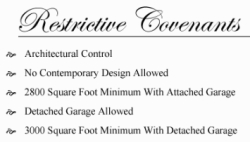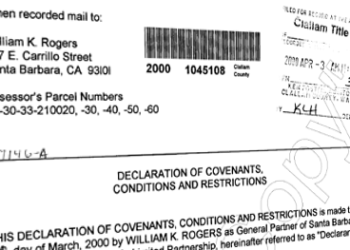Beware Restrictive Covenants. Buying real estate (both land and homes) is full of Traps for the Unwary, and one of those traps includes covenants, also known as CC&Rs (Covenants, Conditions, & Restrictions).
Restrictive Covenants
If you purchase property and have no idea what the restrictive covenants are, you could be in a world of hurt later. When you purchase real estate, the most important documents is the Statutory Warranty Deed, and the second most important document would be the restrictive covenants. The restrictive covenants define the restrictions effecting your property, and the penalties if you violate those restrictions.
For example, you may be restricted to a stick built home, residential use only (no businesses), no more than two cars parked along your curbside, no garbage cans permitted on the road except on garbage day, no more than two household pets, a height limitation on fences, height restrictions of a house roof line, and so on. You don’t want to purchase property, build a home, bring in your beautiful motor home, only to find out you can’t park a motor home outside your house.
Some restrictive covenants are very specific.
You may be required to keep the grass mowed no longer than seven inches, and there may be restrictions on the types of trees you can plant. There may be minimum maintenance standards for your landscaping and home exterior.
Now, here is where it most often gets sticky. This is where the vast majority of disputes fester within an Association. This is the black hole into which most of the Association legal fees disappear.
Restrictive Covenants Give Power & Take Power
 Restrictive covenants authorize the creation of a Homeowners’ Association, and once the Association is organized (and typically incorporated), a Board of Directors is appointed, and the Board then creates a set of Bylaws, which govern the rules and procedures of the entire Association. The Board decides how much assessments should be for the association. Assessments are like property taxes. You pay them or a lien can be filed and foreclosed. The Board can make assessments for whatever they deem appropriate within the subdivision.
Restrictive covenants authorize the creation of a Homeowners’ Association, and once the Association is organized (and typically incorporated), a Board of Directors is appointed, and the Board then creates a set of Bylaws, which govern the rules and procedures of the entire Association. The Board decides how much assessments should be for the association. Assessments are like property taxes. You pay them or a lien can be filed and foreclosed. The Board can make assessments for whatever they deem appropriate within the subdivision.
The Board answers to the homeowners, but that’s a little like saying the President answers to the people, or your Congressman answers to the state citizens. Okay, it’s not exactly the same, because there are fewer voters in your association, and so each one has more power. Still, I can testify under oath after 20 years of real estate law practice that this is an area fraught with conflict.
I’ve included another section on Homeowners’ Associations, and that section includes much more on Boards, case law, and facts to show you what you should know before you buy into a neighborhood.
Conclusion. Before you buy property, know what the restrictive covenants say, and find out about how the Homeowners’ Association operates. Is everything running smoothly. Is there a good set of documents from the restrictive covenants to the Articles of Incorporation to the Bylaws, and does the Board operate smoothly with good leadership?
Many people have had to retain attorneys and spend thousands of dollars on attorney’s fees in disputes about their rights and obligations under the restrictive covenants and the Bylaws. Assessments are usually the issue.
This would be one of the best reasons to make sure your Realtor is a knowledgeable and experienced agent. I realize this sounds like I’m trying to sell my services as a Realtor to you. I am, but don’t you think I’m working awful hard to do that? Even if you don’t hire me, I’m still giving you value. Whatever you decide to do, the information I have given you here and in the links above, will keep you in good company, out of trouble and help you enjoy your new home. What’s better than peace in the neighborhood? How much is peace of mind worth?
Know your restrictive covenants.
Last Updated on July 22, 2007 by Chuck Marunde

































